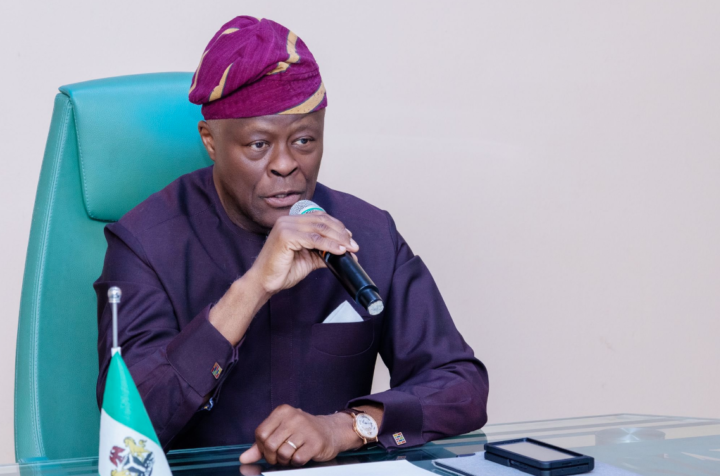…says beneficiaries of social safety program to hit 10m households in October
The federal government has disclosed plans to stop the deductions for cost of revenue collection, which is usually paid to revenue collecting agencies, including Federal Inland Revenue Service (FIRS), Nigerian Customs, Nigerian Upstream Petroleum Regulatory Commission (NUPRC) among others.
Wale Edun, the minister of finance and coordinating minister of the economy stated this in Abuja on Wednesday, during the launch of the National Development Update (NDU).
According to the report, while the government’s gross revenues has been on the rise, a huge sum is also being paid as deductions to revenue collecting agencies, without corresponding impact on national development.
Edun in his remarks said that the government is making effort and work is in progress in terms of the review of the different deductions.
He said, “Funds have flowed to the federation account, but the point is this, efficiency of that spending is critical, and we have been mandated by his excellency, Mr. President, to take a look at deductions, not just the deductions for cost of collection, but deductions generally.
“When you look at the gross figure, you see all kinds of deductions before you get to the net distributable figure, which goes to the federal state and local governments. And I must inform that even during the last FAAC allocation, most of those deductions have been removed once and for all.”
He said that the government is focused on achieving stronger fiscals, through greater transparency, efficiency, and funding for development at the federating units, both at the federal government and states.
The NDU report also indicated a higher spending by both federal and subnational governments. Subnational governments recorded increase in their capital expenditure (capex), which accounts for almost 60-65 percent of their spending. It also rose from almost one percent of GDP in 2022 to 2.7 percent of GDP projected in 2025.
Read also: 139m Nigerians still living in poverty despite reforms – World bank
However, in the period under review, wages and salaries account for around 70 percent of the spending of the federal government which doesn’t leave too much space for capex.
The report also showed that despite the government’s reform aimed at stabilizing the economy, 139 million Nigerians were still living in poverty. It stated that Nigeria must reduce inflation particularly food inflation, ensure effective use of public funds and expand safety nets, to address the high rate of poverty in the country, and ensure that citizens enjoy the gains of reforms.
However, Edun explained that issue of social safety net, which speaks to bringing home the reform gains, was a promise from the start by the renewed hope agenda of President Tinubu.
He noted that reforms are painful elevating the cost of living and leaving the poorest and most vulnerable at risk. “The promise was they would not be left to their own, they would not be left behind. But you know, it takes resilience, determination.
“We made sure that each person that benefits is biometrically and uniquely identified by their name. Kudos to the management of the Nigerian identity management company. And likewise, those on the social register, we also made sure that they had a digital methodology for giving them the funds so that you had the transparency there, you had the accountability there.
“And once we had put in place the right technology and the right methodology, it started to zoom such that we are still implementing the first stage of the social safety net, the direct benefit transfers. By the end of October, we’ll have done about 10 million households covering 50 million Nigerians. Long before the end of the year, the commitment is to have completed 50 million households.”
He added that in effort to ensure that the gains of the government’s reforms reach all citizens, especially the vulnerable, the National Economic Council has approved a world-based development program throughout the 8,809 wards.
“So that is where the connection will be to bringing the gains home, drilling down to make sure all Nigerians get a chance to participate in a growing, in a stable, and in a very positive trajectory of the Nigerian economy,” he added.

